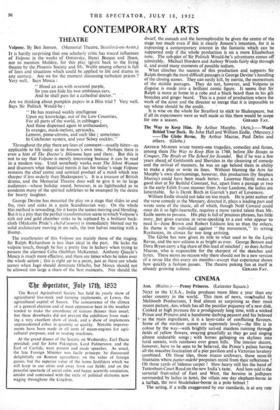CONTEMPORARY ARTS
THEATRE
Volpone. By Ben Jonson. (Memorial Theatre, Stratford-on-Avon.) IT is hardly surprising that one scholarly critic has traced influences of Volpone in the works of Ostrovsky, Henri Becque and Ibsen, not to mention Mohere, for this play (given' back to the living theatre by the Phoenix Society and Mr. Wolfit among others) is full of lines and situations which could be applied to life and drama in any century. Are we for the moment discussing turbulent priests ? Very well. Says Mosca : "Hood an ass with reverend purple, So you can hide his two ambitious ears, And he shall pass for a cathedral doctor." • Are we thinking about pumpkin papers in a Hiss trial ? Very well. Says Sir Politick Would-be : "He has received weekly intelligence Upon my knowledge, out of the Low Countries, For all parts of the world, in cabbages ; And those dispensed again to ambassadors, In oranges, musk-melons, apricocks, Lemons, pome-citrons, and such like ; sometimes In Colchester oysters, and your Selsey cockles."
Throughout the play there are lines of comment—usually bitter—as applicable to life today as to Jonson's own time. Perhaps. there is even a hint of The Doctor's Dilemma here and there. But this is not to say that Volpone is merely interesting because it can be read in a modern way. Until somebody works over The Silent Woman and discovers what theatrical merits it has for today's stage Volpone remains the chief comic and satirical product of a mind which was Sharper if less orderly than Shakespeare's. It is a treasure of British drama, and the Memorial Theatre does well to give it to its large audiences—whose holiday mood, however, is so lightheaded as to condemn many of the spirited subtleties to be swamped by the desire for hearty laughter.
George Devine has mounted the play on a stage that slides to and fro, rises and sinks in a quite Scandinavian way. On the whole this method is rewarding, for it keeps the scenes moving and blending. But it is a pity that the perfect transformation scene in which Volpone's rich red and gold chamber sinks to be replaced by a brilliant back- cloth (Malcolm Pride's chef-d'oeuvre) is immediately blotted out by solid architecture moving in on rails, the two halves meeting with a thump.
The excellencies of this Volpone are mainly those of the staging. Sir Ralph Richardson is less than ideal in the part. He lacks the vulpine touch, though he has a pretty line in lechery when trying to possess the alarmed Celia (Siobhan McKenna). Anthony Quayle's Mosca is much more effective, and there are times when he takes over the whole action ; this is right up to a point, just as there are whole scenes when Iago should dominate Othello, but Mosca should not be allowed too large a share of the best moments. Nor should the dwarf, the eunuch and the hermaphrodite be given the centre of the stage too much even If this is clearly Jonson's intention, for it is expressing a contemporary interest in the fantastic which can be supported only if the whole production is on a more Elizabethan note. The sub-plot of Sir Politick Would-be's adventures comes off admirably. Michael Hordern and Aubrey Woods fairly skip through it, and avoid many moments of possible tedium.
What clinches the success of this production and supports Sir Ralph through the most difficult passages is George Devine's handling of the closing scenes. They can easily kill, by inertia, the momentum of the middle passages. They do not, however, and Volpone in disguise is made into a brilliant comic figure. It seems that Sir Ralph is more at home in a robe and a black beard than in his gilt breeches and ginger beard. This is a point of production where the work of the actor and the director so merge that it is impossible to say whose should be the credit.
It is wise on the whole for Stratford to stick' to Shakespeare, but if all its experiments were as well made as this there would be scope


































 Previous page
Previous page